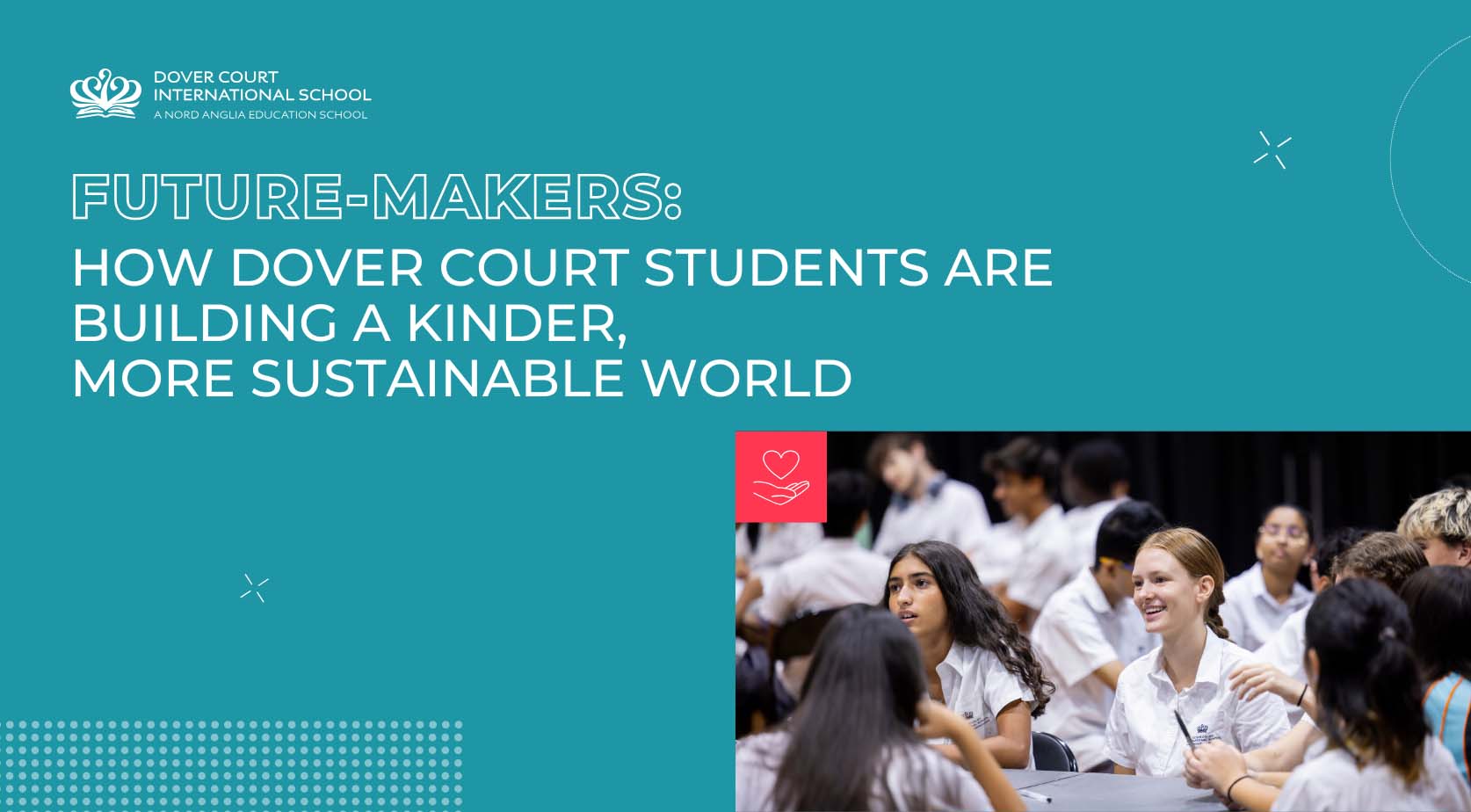We use cookies to improve your online experiences. To learn more and choose your cookies options, please refer to our cookie policy.

At Dover Court International School (DCIS), our students aren’t just preparing for the future – they’re working to make it better, for everyone. From global leadership summits to local inclusion initiatives, DCIS students are proving that compassion, advocacy, and action are central to their education.
Recently, Year 13 students Lydia and Dominik represented DCIS at the Sustainability Dialogue 2025, hosted by the British Chamber of Commerce Singapore. Engaging with industry leaders and policymakers, they explored how organisations can promote sustainability and resilience in response to climate change. Lydia reflected, “Education is a driver for change, but without purpose, it doesn’t translate into meaningful action.” Dominik added, “The speakers reminded us that youth voices are central to advancing sustainability.” Their insights are already sparking conversations on how DCIS can become even more environmentally conscious.

That commitment to sustainability is also evident in the younger years. Through the Primary Planet Protectors programme, we empower our students in Primary School to take action for the environment through hands-on learning and advocacy. Their efforts were recently recognised with the Bronze Eco-Schools Award from WWF Singapore, celebrating our commitment to environmental education and sustainable practices. From recycling to biodiversity projects, these students are showing that you don’t need to be older to make a difference – it starts with curiosity, care, and the chance to get involved.

Taking their commitment to global issues further, four Year 9 students at DCIS – Abdullah, Aniket, Eloise, and Shravya – joined peers from across Nord Anglia Education (NAE) schools at the NAE Student Summit in Houston this year. With support from UNICEF, they explored the UN Sustainable Development Goals and Children’s Rights, volunteered at the Houston Food Bank, and presented their Capstone project, “Teen Talk,” which addressed real-world issues through collaborative problem-solving. Their experience deepened their understanding of global citizenship and strengthened their commitment to local action.

Back on campus, DCIS students are also leading meaningful change through the Inclusion Ambassador Programme, which empowers students to explore inclusion, neurodiversity, and disability from multiple perspectives, helping to advocate for a world where everyone feels seen and supported. They learn how to use respectful and inclusive language, rethink assumptions about people with different needs, and create projects that help everyone feel included with the goal of leading by example and inspiring younger students to do the same.

Juliet, a Year 13 student, shared, “Being an Inclusion Ambassador helped me understand what language can be seen as offensive and how to use the right words to avoid unintentionally hurting someone.” Jocelyn, another Year 13 student, added, “It showed me how important it is to make changes so everyone can have the best school experience.” Juliet also reflected on the ripple effect of the programme: “Now that I have this knowledge, I can pass it on to other students who may not be aware of these issues. I feel motivated to learn even more about neurodiversity so that I can share more with others.” Last year’s programme culminated in a powerful visual statement recently: students gathered on the school field to form a human infinity symbol, representing the boundless potential of inclusive education and the neurodiversity movement.

This culture of care extends to mental health and well-being. In a powerful step toward creating a suicide-safe community, DCIS Sixth Form students and parent volunteers took part in safeTALK training. Led by Deputy Head Jacqueline Glazerman and School Counsellor Melanie Lyons, this programme equips participants with the skills to recognise signs of suicidal thoughts and how to respond with empathy and action and builds confidence in having difficult conversations and connecting peers with support. This initiative is another way DCIS is empowering students to care for themselves and others – because wellbeing is essential to learning and leadership.
Whether they’re advocating for climate action, championing inclusion, or collaborating across cultures, DCIS students are not waiting for the future; they’re shaping it now. And it’s precisely this culture of kindness, personalised learning, and purposeful action that has driven the school’s remarkable 50+ years of success.
At Dover Court, inclusion isn’t just a value – it’s a strategy for student achievement. Students consistently perform well above global averages in the IB Diploma Programme (IBDP) and IGCSE, and secure offers from some of the world’s top universities. The school’s commitment to belonging and equity ensures that every student feels empowered to thrive – academically, socially, and emotionally.
For prospective parents seeking a school where values meet results, Dover Court International School in Singapore offers a vibrant, forward-thinking community where students are not only prepared for the future, but equipped to lead it.
